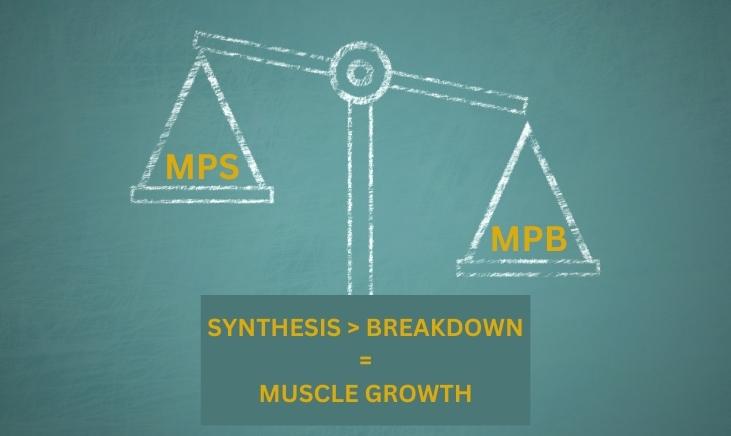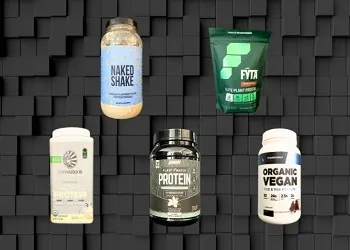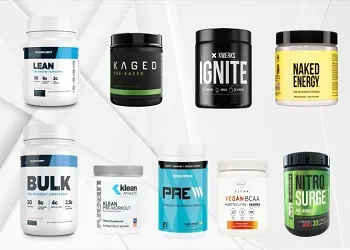Muscle protein synthesis (MPS) is the science behind building muscle, and we’re going to break down this magnificent process for you in this article.
At a cellular level, protein synthesis is the process by which proteins are built. Proteins are needed for various functions throughout the body, but we will be focusing on this process in skeletal muscle because that’s where muscle growth in response to exercise and nutrition occurs. (And that’s why you’re here, right?)
MPS and muscle growth are not the same thing, however. If you’re looking to build muscle effectively, MPS plays an important role in muscle growth. In this article, we will dig deeper into this topic as well as factors that affect MPS, how to increase MPS, supplements, and muscle protein breakdown (MPB).
Table of Contents
Key Takeaways
- Muscle protein synthesis (MPS) is the process by which amino acids are used to build new muscle proteins.
- Resistance training plus adequate protein intake throughout the day and post-exercise may increase MPS.
- A sedentary lifestyle, stress, age, fasting, and poor sleep habits contribute to muscle protein breakdown (MPB).
- MPS must be occurring at a higher rate than MPB to increase muscle mass.
- Protein intake considerations for MPS should include type, timing, and amount.
Overview of Muscle Protein Synthesis
If you remember anything from high school biology, you may recall that amino acids are the building blocks of protein. So, for us to build muscle, we need amino acids. Our bodies produce nonessential amino acids; however, we need to consume the nine essential amino acids through diet. Hence the interest in nutritional interventions for muscle growth.
Muscle proteins are broken down into two classes: myofibrillar and mitochondrial.
- Mitochondrial proteins play a larger role in endurance training. Mixed muscle protein synthesis is when you are taking into account both of these protein classes.
- Myofibrillar proteins are more popular in nutrition and fitness research because they are the ones responsible for growing muscle mass, so those are the ones we’re interested in here.
How does muscle protein synthesis work to enhance muscle growth?
Skeletal muscle protein synthesis is important because it is how the body builds and maintains muscle mass. Research has established that muscle hypertrophy is often related to increased MPS following resistance training.
Muscle protein turnover is constant, which is key for muscle growth because it allows new proteins to synthesize. The muscle protein synthesis rate is about 1–2% per 24 hours in healthy individuals. To put it into perspective, this is the rate at which it would take to build a new muscle entirely. Without going into too much detail, this is good news to know that noticeable changes in skeletal muscle can happen within weeks to months.

Protein Balance
Protein balance indicates whether a muscle is growing (hypertrophy) or diminishing (atrophy). For healthy, physically active individuals, this protein balance stays either positive or the amount of muscle is maintained. Muscle maintenance is when MPB and MPS are equal.
The protein synthesis rate must be greater than MPB for growth to happen. Muscle protein breakdown (MPB) is primarily associated with elderly populations, physical inactivity, and fasting.
Factors that Affect Muscle Protein Synthesis
When it comes to muscle hypertrophy, some of it will come down to genetics and your biological makeup. Muscle protein synthesis is a naturally occurring process that can only be manipulated to a certain extent. With that being said, there are a few factors that can impact the rate at which muscle protein synthesis occurs, and you can use these factors to your advantage to build lean muscle.
- Exercise
- Nutrition
- Sleep
- Stress
Exercise
Resistance training is associated with higher muscle growth, which is attributed to higher MPS. This is because high-intensity resistance training causes a bit of MPB. This seems bad, but it is the catalyst to muscle growth because when it is repaired, it repairs at a higher rate of MPS.
Exercise causes tiny muscle tissue tears, and then it repairs. This is related to why we feel sore after resistance training because this is what causes delayed onset muscle soreness (DOMS). The repair stage is when your MPS rate ramps up to repair the damage and build back muscle proteins.
Bear in mind, you want to push yourself, but to an extent. Slight muscle damage leads to growth, but too much damage causes too much damage to the muscle (simple logic). Too much damage will increase the time you need to recover and spread out your training sessions too much to consistently build muscle.
Nutrition
As mentioned above, we need amino acids to build proteins. Our bodies produce nonessential amino acids; however, we need to consume the nine essential amino acids through diet.
Most people that eat a whole-food-based diet full of diverse sources of lean proteins, dairy, eggs, nuts, and legumes get enough complete protein through food. However, those who are under intense training protocols or looking to build muscle may need to increase their protein intake. This is also true for those who follow a vegan or vegetarian diet since fewer plant products are complete protein sources, although there are plenty of plant foods that pair together to create a complete protein, for example, beans and rice. Also, supplementation can be beneficial in these groups.
Sleep
Getting adequate sleep is not only important for overall mental and physical well-being, but it is also crucial for muscle recovery. Aim to get at least 7–9 hours of sleep at night.
Stress
Like sleep, stress is another overarching theme that can impact muscle protein synthesis. Cortisol is known as the stress hormone, and when it’s elevated, it both suppresses protein synthesis and increases the breakdown of proteins.
Are there supplements that increase protein synthesis?
Yes and no. Some supplements may indirectly stimulate muscle protein synthesis. However, protein is the star of the show in the case of muscle protein synthesis to improve muscle growth.
No supplement will replace a resistance training regimen when it comes to stimulating muscle protein synthesis. Supplements are only effective in helping to build muscle when paired with strength training.
Protein
As discussed in the above sections, dietary protein, including supplements, combined with resistance training is beneficial for increasing MPS. This is a well-known benefit of protein, but when supplementing with protein, it’s also important to consider the amount, type, and timing.
Amount
First and foremost, it’s important to consume the right amount of protein. For healthy people looking to build muscle, the International Society of Sports Nutrition (ISSN) recommends for individuals to consume 1.4 to 2.0 grams of protein per kilogram of body weight daily. For post-exercise muscle protein synthesis, 20–40 grams, or 0.3 grams per kilogram of body weight, of protein is recommended following a workout.
More is not always better when it comes to protein, since your muscles can only synthesize so much. It’s best to stay within your recommended intake, as consuming excess protein is a waste (which can be pricey) and may negatively impact gut microbiota. Try using a protein calculator to determine your optimal intake.
Type
It’s not all about quantity when it comes to protein, it’s also about quality. It’s best to choose a complete protein source, like whey, to account for all amino acids, including essential and nonessential. However, if you prefer a plant-based protein supplement, you can combine sources to create a complete plant-based protein.
Timing
Adequate protein intake following resistance exercise is considered by some the “window of opportunity” or the “anabolic window.” This is because post-exercise muscle protein synthesis is an integral part of muscle growth and recovery.
Perhaps the most notable thing to know about protein timing is that studies have shown MPS is more effective when protein intake is distributed throughout the day rather than taken all at once or concentrated in an evening meal, for example. Since MPS is estimated to last 5–6 hours, protein should be consumed in intervals throughout the day to maintain a continuous supply of amino acids during waking hours. This roughly equates to three meals containing 0.53 grams per kilogram of body weight per meal.
Additionally, this 2013 study reported small benefits to MPS by consuming protein in both pre- and post-workout meals. The authors stated a 3–4 hour window to consume the meals is optimal.
The timing aspect of dietary protein intake as it relates to MPS is perhaps the most complex, and the area where many sports science researchers have focused their efforts. However, rather than focusing on the nitty-gritty of protein intake timing, it’s more important that you are getting the right amount of complete proteins to aid MPS.
Essential Amino Acids
There are nine essential amino acids (EAAs) that our body doesn’t make, so we have to ingest them from external sources, through food or supplements. For the majority of the population, it’s easy to get all of the necessary EAAs from a healthy, balanced diet.
Branched-chain amino acids (BCAAs) receive a lot of attention in the fitness industry, which are three EEAs that have a “branched” structure (Isoleucine, leucine, and valine). Leucine has the most substantial evidence base. However, BCAAs alone do not facilitate an increase in MPS because all amino acids are required to synthesize a protein.
Similarly, essential amino acids are very important and may contribute to growth, but will not facilitate muscle protein synthesis alone.
HMB
Beta-hydroxy beta-methyl-butyrate (HMB) is a byproduct of the essential amino acid leucine. Emerging research indicates that HMB may help combat MPB, especially in older individuals suffering from sarcopenia (muscle loss).
Carbohydrate Supplements
Hypothetically, there are reasons why combining carbohydrates with protein post-workout is beneficial. But more studies are needed comparing the combination of protein and carbs for increasing muscle mass through MPS compared to protein alone.
How to Increase Muscle Protein Synthesis
As mentioned above, there are a few ways to enhance muscle protein synthesis in favor of building and maintaining muscle. These ways include doing high-intensity resistance training, consuming an adequate amount of complete protein sources throughout the day, getting adequate rest (including sleep), and keeping stress levels low.
Final Thoughts
Muscle protein synthesis is a natural metabolic process that is constantly occurring in our bodies, but there are some factors that we are in control of that determine the rate of MPS. By understanding how muscle protein synthesis works and the factors that affect it, you can optimize your muscle growth and recovery.
Hopefully, this article serves as a helpful breakdown of muscle protein synthesis and how it relates to muscle growth. However, if you want to know more and put this information into practice, consider booking a consultation with a nutrition and fitness expert. This will ensure you receive individualized advice tailored to your fitness goals.
FAQ
What increases muscle protein synthesis?
You can optimize muscle protein synthesis by doing high-intensity resistance training, eating the proper amount of protein throughout the day and post-exercise, getting enough sleep, and managing stress.
What is the rate of protein synthesis in muscle?
The rate of protein synthesis in skeletal muscle is 1–2%.
Why is muscle protein synthesis important?
Muscle protein synthesis is important for muscle growth, repair, and maintenance.
What does muscle protein synthesis do?
Muscle protein synthesis is the process where new muscle proteins are formed from amino acids.
How long does muscle protein synthesis last?
Muscle protein synthesis lasts around 4–5 hours, hence why it’s recommended to consume protein throughout the day to make the most of this time.
Is muscle protein breakdown good or bad?
A certain amount of muscle protein breakdown (MPB) is needed for muscle growth. However, it’s important that the rate of muscle protein synthesis is higher than MPB to gain muscle.
How much protein can your muscles synthesize?
Ingested at one time, 20–25 grams of dietary protein is enough to maximize muscle protein synthesis.














